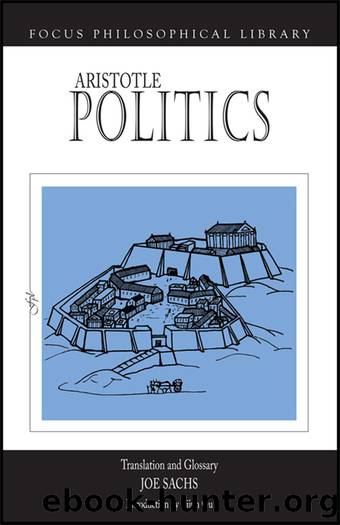Politics (Focus Philosophical Library) by Aristotle

Author:Aristotle
Language: eng
Format: mobi
Publisher: Hackett Publishing Company, Inc.
Published: 2012-09-01T03:00:00+00:00
_______________________________________
117 In Plato’s Statesman (302E-303B), the Eleatic Stranger argues that the weakness of democracy makes it worse than any decent government that has power in fewer hands, but safer than any corrupt one.
118 See the footnote to 1278b 23 above. Aristotle is referring to the passage beginning in 369B of the Republic, in which Socrates describes what Glaucon memorably calls a city of pigs. Socrates, as a first and minimal hypothesis, imagines a city that satisfies only the simplest needs of life and health; the inadequacy of that city provokes a spontaneous response from the young men he is speaking to, who then take part in searching for a more acceptable account.
119 No sixth part has been mentioned, but the end of Bk. VII, Chap. 8, below, gives a similar list that includes priests.
120 The line quoted is spoken by Odysseus at II, 204 of the Iliad, when he has turned the Achaeans back from a disorderly mob into an army, and restored the supreme command to Agamemnon. Aristotle may find its application ambiguous in a political context, but he cites it with no such hesitation at the end of Bk. XII of the Metaphysics.
121 Something is missing in the manuscripts, and Ross hesitantly suggests the “not.” The “revenue” mentioned is explained below as public funds to pay for service in the assembly.
122 See the footnote to 1270b 24 above.
123 The translation follows Ross’s editorial insertion. The text is unclear, but I take the meaning of the argument in this paragraph to be that politeia (constitutional rule) is a name that rightly applies to a form that blends two criteria for holding office that can be constitutionally specified, property ownership and free birth. It is not a matter of definition that excludes the third criterion, but the fact that virtue is different in kind from the other two. Where someone from the poorer class can be voted into higher office on the basis of merit, the government is a form of aristocracy. But if those voting mistake the advantages of wealth for virtue, the basis for higher office is still in fact the property qualification characteristic of constitutional rule.
124 The word sumbolon, usually translated “tally,” referred to the irregularly shaped halves of a broken coin divided between two parties to a contract.
125 By referring to the mean (to meson), Aristotle is excluding intellectual excellence and speaking of virtue of character. The principal such virtues are courage, temperance, and justice. These are not attributes of a middling or mediocre sort of person, nor are they out of the reach of any person. They are means in the sense that they belong to a state of character that is not controlled by momentary impulses of fear, desire for pleasure, or greed, but has not overcome those impulses by substituting for them a rigid discipline of self-denial. The life of virtue, as Aristotle describes it in the Nicomachean Ethics, is a life of unimpeded self-fulfillment, lived through the power of choice. Anyone who
Download
This site does not store any files on its server. We only index and link to content provided by other sites. Please contact the content providers to delete copyright contents if any and email us, we'll remove relevant links or contents immediately.
The Secret History by Donna Tartt(16623)
The Social Justice Warrior Handbook by Lisa De Pasquale(11489)
Thirteen Reasons Why by Jay Asher(7788)
This Is How You Lose Her by Junot Diaz(5772)
Weapons of Math Destruction by Cathy O'Neil(5037)
Zero to One by Peter Thiel(4824)
The Myth of the Strong Leader by Archie Brown(4789)
Promise Me, Dad by Joe Biden(4447)
Beartown by Fredrik Backman(4419)
Stone's Rules by Roger Stone(4415)
How Democracies Die by Steven Levitsky & Daniel Ziblatt(4399)
The Fire Next Time by James Baldwin(4343)
100 Deadly Skills by Clint Emerson(4078)
A Higher Loyalty: Truth, Lies, and Leadership by James Comey(4033)
Rise and Kill First by Ronen Bergman(4012)
The David Icke Guide to the Global Conspiracy (and how to end it) by David Icke(3882)
The Farm by Tom Rob Smith(3872)
Secrecy World by Jake Bernstein(3782)
The Doomsday Machine by Daniel Ellsberg(3731)
